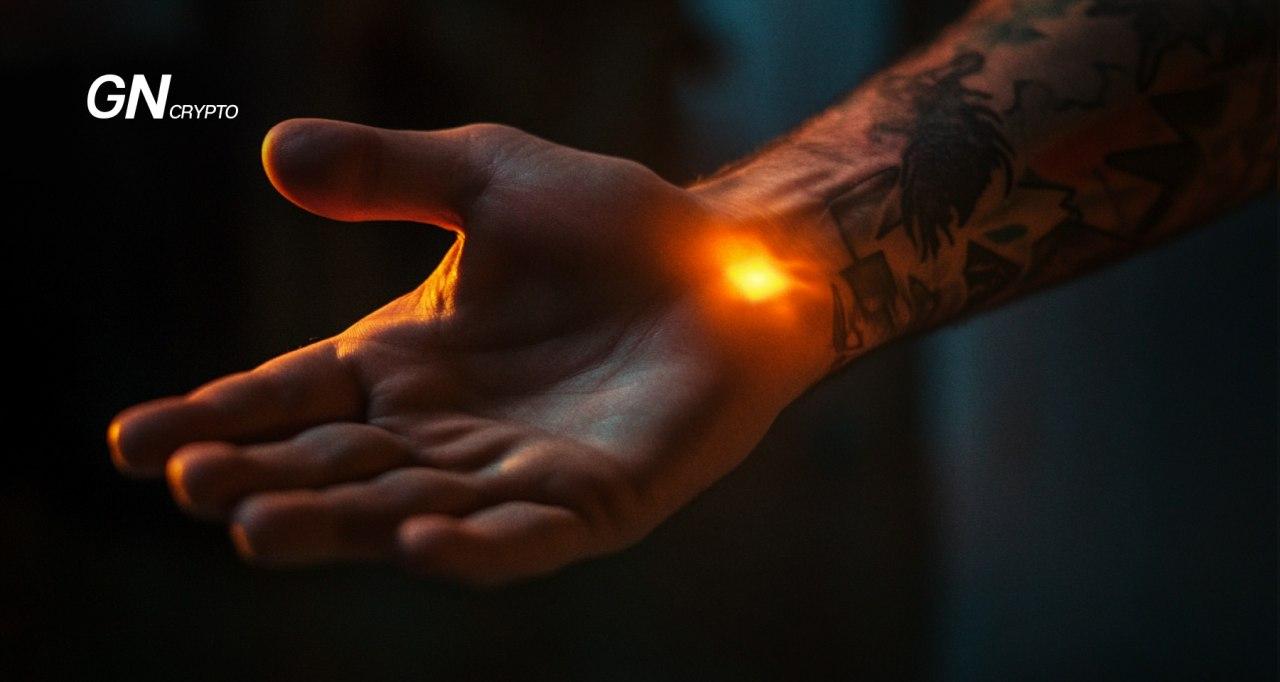Cryptocurrency Under the Skin: The Future is Here!

Vivo Key Technologies and Dangerous Things developed a cryptocurrency wallet that can be implanted under the skin. Say goodbye to the hassles of lost passwords and security breaches! This innovative implant ensures your digital currency is secure—unless someone literally steals your hand. Be mindful in stores, as a simple hand wave could lead to unintended purchases.
On this page
The fear of losing a cryptocurrency wallet full of Bitcoin or other cryptocurrencies can keep any investor up at night. Now, there’s an innovative solution that secures your assets in an unprecedented way: by embedding them under your skin.
We've transitioned from paper, software, and hardware wallets to those that come as credit cards and a ring, but the newest frontier is a wallet that exists as a chip.
The Apex chip is ultra-thin and designed for easy subdermal implantation. Source: vivokey. com
For several years, Vivo Key has been at the forefront of developing processors for contactless interactions. Their innovations include cryptobionic implants for unlocking doors, controlling Tesla vehicles, and a ring for contactless payments similar to Apple Pay, among other gadgets equipped with NFC microchips.
The Apex Flex wallet is implanted under the palm's skin using an injection-like procedure. The chip is inserted through the small incision, and a standard adhesive bandage is applied. The Apex Flex is operational immediately post-installation, with complete healing occurring within 2–4 weeks. The cost of the implant includes its insertion, and although the procedure is simple enough to perform independently for those not squeamish about needles, all necessary tools and anesthetics are available for purchase on the manufacturer's website.
A flexible needle for the Apex implant installation. Source:dangerousthings.com
Amal Graafstra, founder of Dangerous Things, explains the functionality: “You use an app on your phone, but the most important key is stored on a chip in your body.”
Graafstra was inspired to create his first implant in 2005, influenced by RFID chips used for pets. After consulting with doctors and developing a system that allowed him to unlock doors using a chip, he ventured into producing subdermal microchips for various applications.
Graafstra believes that reluctance towards such implants mostly stems from the lack of apparent use cases.
The first thing that comes to mind is that people don't see a use case for which they would want to implant a chip in themselves. Then comes the reason “I'm afraid of surveillance.” This shouldn't be taken too seriously, because if it were a serious problem, then no one would use, for example, a mobile phone. Everyone knows that the device is being monitored, but its benefits outweigh this.
According to VivoKey, the Apex Flex is a BIP32/39 wallet (a seed phrase standard) that allows users to securely store cryptocurrencies and conduct blockchain transactions with any asset. Despite the $399 cost of the implanted device, customer demand remains high, evidenced by a steady stream of pre-orders.
The Apex acts as a secure authenticator where a cryptocurrency wallet app can be deployed. It can’t be lost or forgotten, requires no charging, is compatible with iOS and Android, and comes with a 50-year warranty, although the manufacturer notes that the chip can be removed or replaced at any time if desired.
The content on The Coinomist is for informational purposes only and should not be interpreted as financial advice. While we strive to provide accurate and up-to-date information, we do not guarantee the accuracy, completeness, or reliability of any content. Neither we accept liability for any errors or omissions in the information provided or for any financial losses incurred as a result of relying on this information. Actions based on this content are at your own risk. Always do your own research and consult a professional. See our Terms, Privacy Policy, and Disclaimers for more details.



























